In the lead-up to suicide prevention day/week/month, I wondered what people’s experiences of contacting crisis lines was because I’ve never used one myself (I hate talking on the phone with a passion). Thus, I decided to ask on social media what people’s experiences were of using a crisis line, in the process I created this social media survey.
So this is the simple question I put out on social media:
Have you ever called a mental health crisis line, and if so, how useful did you find it? All answers will be used in a #blog post (unless you tell me you don’t want to feature in it)
This was my follow-up question:
What do you think they could do differently to make it a better supportive experience?
Crisis Lines: Introduction
Traditional mental health services often only work during the regular 09.00-17.00 working week. Then there’s often the waiting lists you’re placed on before you even start getting counselling. This is where crisis lines, helping lines, and all the other support services come in. They work to try to fill the gap left in our mental health services.
It’s unfortunate that such services are needed, but when you’re stuck on a waiting list but still need support, such services are a lifesaver to people struggling whilst they’re waiting to start treatment. It also helps people struggling between sessions too. This is especially true of the 24/7 support services because having a crisis can happen at any time, no matter where you are or what you’re doing.
According to the Samaritans (2018), in the UK & Republic of Ireland, there were 6,859 suicides in 2018. In the UK, there were 6,507 suicides. In the Republic of Ireland, there were 352 suicides. Share on X
Before moving on, let me just say this: this is a very small subjective sample, and shouldn’t be seen as a dismissal of such services. There is nothing scientific about the small sample social media survey I did, it was just a matter of curiosity.
I can’t stress this enough. If you’re in a crisis, please contact a crisis line, messaging service, online chat, friends, family, or anyone who will offer you the support you need.
Crisis Lines Experience
Positive Experiences
@jakeswrites shared their experience with me about how they found using a crisis line. Although it wasn’t entirely a positive experience, the use of the crisis line at least did what it was intended to, stopping someone from making a decision they may not be able to come back from.
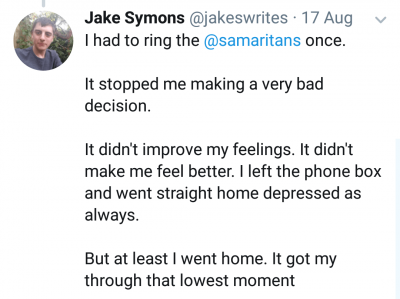
When I asked a follow-up question, @jakeswrites was kind enough to offer some insight as to how it was helpful.
Is it ok to ask, was it just having someone there to talk to that helped or were they well trained and/or empathic, and that was able to reach you in your time of crisis?
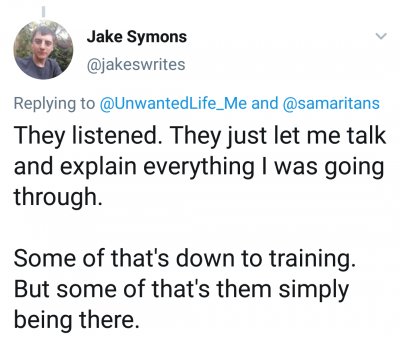
Just being there and being allowed to talk can make a lot of difference, which is how anyone can be helpful to people having an emotional crisis. My previous article, Suicide And Suicide Prevention: Advice And Information, also has some other potentially useful tips on how to handle such encounters should you find yourself in such a situation.
I really don’t like talking on the phone, which, much like me, is how @ItsNicoleCarman ended up using a crisis text service when they felt they needed some support.
Unfortunately, they didn’t have the best experience, only finding it mildly helpful. When I asked what they could do better to improve the service, they stated it was more due to them not liking this kind of interaction when seeking support, preferring face-to-face instead, rather than something the crisis text service did.
Another use of such services isn’t just to get support for yourself, but as a source to gain the information, you can use to help someone else in their time of need. Another Twitter user, @JVan3610, had this exact experience.
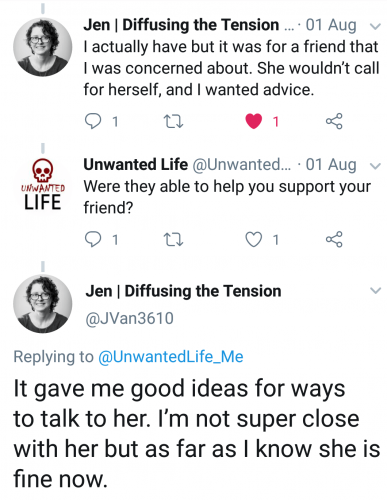
The following detailed experience of using a crisis line multiple times was offered by someone who wanted to remain anonymous but still wanted to share their story.
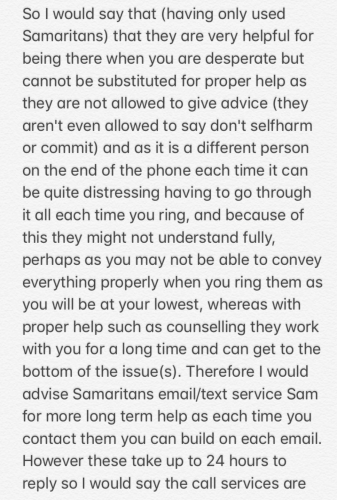
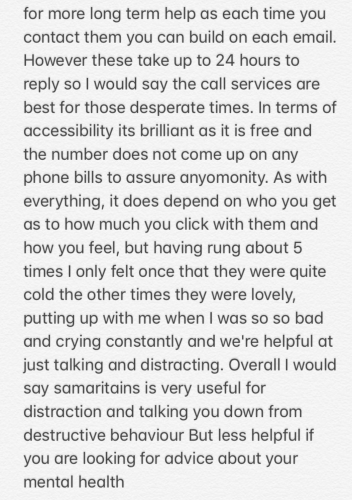
They make a good point. Crisis lines are a valuable resource for when you’re in a desperate state and need support. But they shouldn’t be seen as a replacement for proper mental health treatment.
The last of the positive experiences come from @Ronniecanerc, who has used two UK services. Their experiences of using these services seem to have been very positive. On a side note, both these services are listed on my Global Crisis Lines And Support and UK Crisis Lines And Support page should you need to reach out for support.
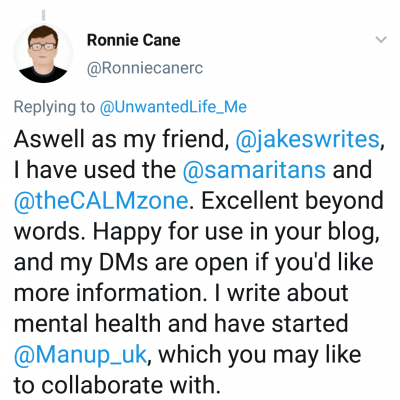
Manup-UK was meant to be a men’s mental health organisation that flipped the script on the “man up” approach to life that leads men to avoid seeking help, and often dying younger because of it. However, it no longer seems to be operating, which is a shame.
Negative Experiences
One of the few people to reply to my little survey with a negative experience was @AmberMeredith14. It’s unfortunate that they didn’t have the best experience with the services they engaged with.
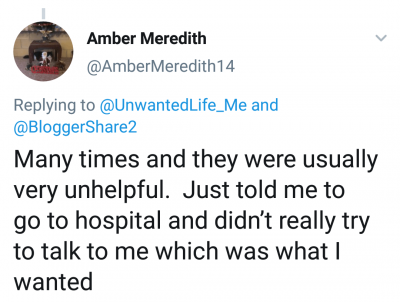
It would appear that @AmberMeredith14 experience was that of just being signposted to the emergency services, rather than offering support and listening to their problems and concerns.
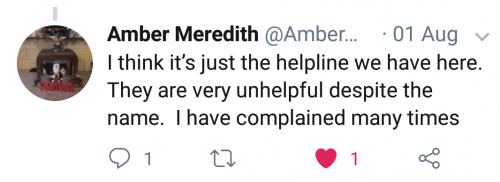
As @AmberMeredith14 pointed out, different services will have different levels of skilled workers on the other end. They will also be trained to handle their services in different ways. Thus, don’t let a bad experience with one service stop you from using another.
Furthermore, as the anonymous person showed, each person will have a different level of skill, which is most likely due to the amount of experience they have. But even a service you find useful can occasionally give you a less good experience, all because you get someone you just can’t build a rapport with.
Another person from Twitter who shared their experience with me was @Jordyn72758776. Like @ItsNicoleCarman, they also used a text service but also didn’t have a great experience.
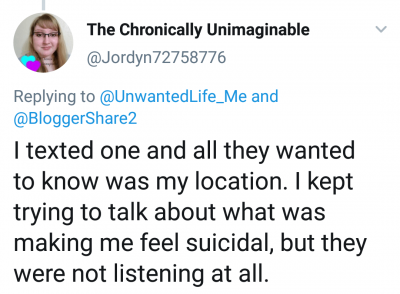
It’s understandable that if you contact such services, you normally do so to talk and engage with someone until the feelings have passed. This would be hard to do if they’re only concerned about your location, rather than building a rapport with you.
Both @AmberMeredith14 and @Jordyn72758776 both lacked the kind of interaction with such services that @jakeswrites got, and that was to be able to talk freely and have someone listen to them above all else.
Crisis Lines Improvement Suggestions
@AmberMeredith14 was kind enough to offer some insight into how such services could improve when I asked my follow-up question.
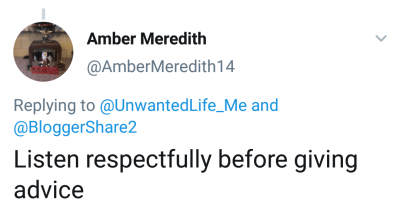
Those who have reported a positive experience, @jakeswrites and our anonymous story provider, all seem to have one thing in common: being allowed to talk. Thus, it’s not surprising that those who felt they had a bad experience would list this as a way to improve the services they engaged with.
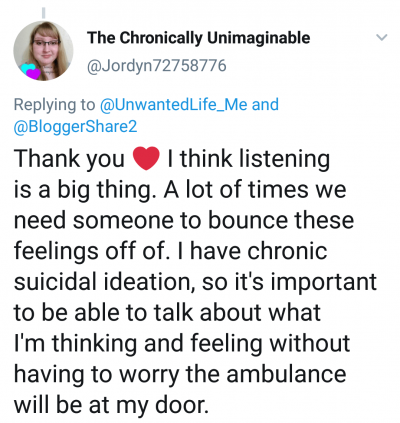
Professional Crisis Support Studies
After I did my small social media survey, I thought it was important to try to add some more professionally done studies and statistics.
Every six seconds, the Samaritans for the UK and the Republic of Ireland responded to a call for help, with five million calls for help being made to the Samaritans each year. To put it another way, that’s 600 calls an hour.
According to a study by Coveney, Pollock, Armstrong, and Moore (2012) who reported findings from an online survey of callers contacting the Samaritans, respondents to the survey reported high levels of satisfaction with the service and also found the service helpful. This goes to show just how needed such services currently are in society.
Gould, Kalafat, HarrisMunfakh, and Kleinman (2007) study found that people who reached out to a telephone crisis support showed signs of decreases in their suicidal thoughts and feelings during their engagement with the service. There was also evidence of a decrease in emotional pain and hopelessness over the following weeks.
However, this study lacked a control group, so it’s not possible to pin down which factors might be the cause of the decrease in suicidal thoughts and feelings. But I still feel it offers some support for the usefulness of having and using crisis lines for support.
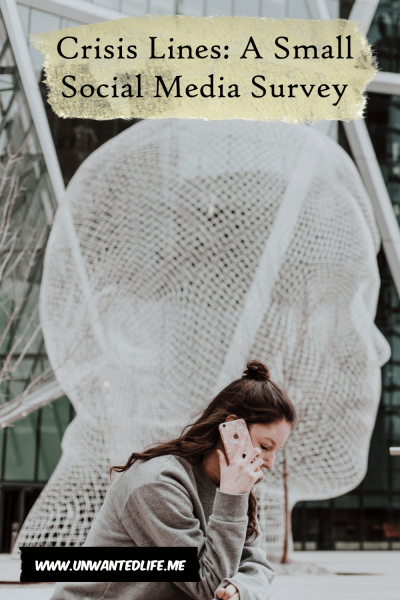
According to an article written by Tracy (2014), Dr Madelyn Gould of Columbia University found the following information on the impact of calling crisis lines for support. Dr Gould reports that 12% of suicidal callers stated that talking to someone at Lifeline prevented them from harming or taking their own lives.
The doctor also reported that approximately 80% said that Lifeline had something to do with keeping them alive, and about 50% took the counsellors’ advice to call the emergency services or contact a mental health service.
I would have liked to have had the details of the report by Dr Madelyn Gould, which Tracy (2014) was reporting on. However, they didn’t include any details or references, so I couldn’t check. So I don’t know how legit the information is.
A slightly more credible source, USA Today, showed just how relevant crisis lines are to society, stating that the National Suicide Prevention Lifeline has 150+ crisis centres and national backup centres to assist local lines. This organisation also answered over 2 million calls in 2017, up from 1 million calls in 2014. This just goes to show how often these lines are used by people in crisis.
A study conducted by Gould, Cross, Pisani, Munfakh, and Kleinman (2013) also supports how useful the National Suicide Prevention Lifeline is to society. In this study, they looked at the effectiveness of the implementation of applied suicide intervention skills training (ASIST). They found that callers appeared to feel less depressed, suicidal, and overwhelmed when speaking with ASIST-trained counsellors when compared to callers who had non-ASIST trained counsellors.
Moving from crisis lines to crisis text services, The New York Times wrote an article in 2017 about the Crisis Text Line service in the US. They stated that the text messaging service has shown to be surprisingly effective as a method to reach out for support. This is largely due to this style of communication being favoured by young people, with 75% of its users being under 25, and 12% being under 13.
The article also reports that this text service has engaged in 56 million messages, which were expected to double within a year. So it’s very likely that this 56 million figure has more than doubled by now.
Furthermore, The New York Times article states that the Crisis Text Line sends out an automated follow-up message after the text support has concluded. They do this to gain insight into if the user found the text conversation support useful or not, reporting 86% user satisfaction with the service.
Thus, it would appear that the text service is an effective way to support the younger people among us. It also shows how a range of different communication platforms for engaging with crisis and other support services can be useful to those in need.
Crisis Lines: Conclusion
Professional crisis support studies have demonstrated that crisis lines are in high demand, thus fulfilling a very important societal service.
One thing that seems to be clear from my little social media survey is that being allowed to talk and be listened to, seems to really make a difference. A view that seems to be supported by the other studies I also mentioned in this article.
This also seems to support my earlier article, Suicide And Suicide Prevention: Advice And Information, whereby step 2 and 10 talk about the importance of listening. This allows the person in distress to talk and unburden themselves, helping them to be distracted until the feelings and thoughts have passed.
It’s important to remember that the people working crisis lines are only human, and they can feel the strain of doing such work. It’s also important to remember that not all crisis support lines and services are the same, so don’t dismiss them all if you’ve had a less-than-favourable encounter with one or one person.
Furthermore, it’s essential to know that you have other ways of keeping yourself safe, such as creating a personal mental health safety plan.
If you’re in a crisis or just need to reach out to someone for support, please check out my Global Crisis Lines and UK Crisis Lines pages for a list of numbers, text, and messenger services you can contact. I’m trying to add as many details for as many countries as possible, so please feel free to give me details for any I don’t have.
Again, this post shouldn’t be taken as any sort of evidence of the valuable role these crisis lines play. There are so many factors that could be at play as to why I received some replies that seem to show that people have had a bad experience with crisis lines. For example, this is a very personal topic to discuss, as evident by the person who wished to remain anonymous. Plus, people with more positive stores might not have felt comfortable discussing their experiences.
I did this small sample survey just to see if there’s anything that can be done to improve such services and because I’d never used a crisis line myself. Nothing more.

I implore you, if you’re in a crisis, please reach out to a crisis line, helpline, crisis messenger service, friends, family, emergency services, or anyone.
You are loved.
You are wanted.
You aren’t a burden.
I and others are here for you.
Please reach out if you need support.
As always, leave your feedback in the comments section below. Also, feel free to share your experiences with having a crisis or using a crisis line or helpline in the comments section below as well. If you want to stay up-to-date with my blog, then sign up for my newsletter below. Alternatively, get push notifications of new articles by clicking the red bell icon in the bottom right corner.
Lastly, if you’d like to support my blog, then you can make a donation of any size below as well. Until next time, Unwanted Life readers.
Support
If you feel you need help, then visit my Global Crisis Lines or my UK Crisis Lines And Support page for a detailed list of Crisis Lines, Help Lines, Text services, Webchat, and more you can contact.
References
For the articles I can’t find free access to, I’ll provide the links to their abstract and provide their doi code so you can look them up. Thus, if you have education access, subscribe to the publications that own the rights to the articles, or have access to them through work, you can read the full article yourself.
Coveney, C. M., Pollock, K., Armstrong, S., & Moore, J. (2012). Callers’ Experiences of Contacting a National Suicide Prevention Helpline: Report of an Online Survey. Crisis, 33(6), 313–324. Retrieved from https://www.ncbi.nlm.nih.gov/pmc/articles/PMC3643796.
Gould, M. S., Cross, W., Pisani, A. R., Munfakh, J. L., & Kleinman, M. (2013). Impact of Applied Suicide Intervention Skills Training (ASIST) on National Suicide Prevention Lifeline Counselor: Interventions and Suicidal Caller Outcomes. Suicide Life Threat Behav., 43(6). Retrieved from https://www.ncbi.nlm.nih.gov/pmc/articles/PMC3838495.
Gould, M. S., Kalafat, J., HarrisMunfakh, J. L., & Kleinman, M. (2007). An Evaluation of Crisis Hotline Outcomes Part 2: Suicidal Callers. Suicide and Life-Threatening Behavior, 37(3), 338–352. Retrieved from https://pubmed.ncbi.nlm.nih.gov/17579545.
Tracy, N. (2014). How Does a Suicide Prevention Hotline Prevent Suicide? HealthyPlace. Retrieved from https://www.healthyplace.com/suicide/how-does-a-suicide-prevention-hotline-prevent-suicide.

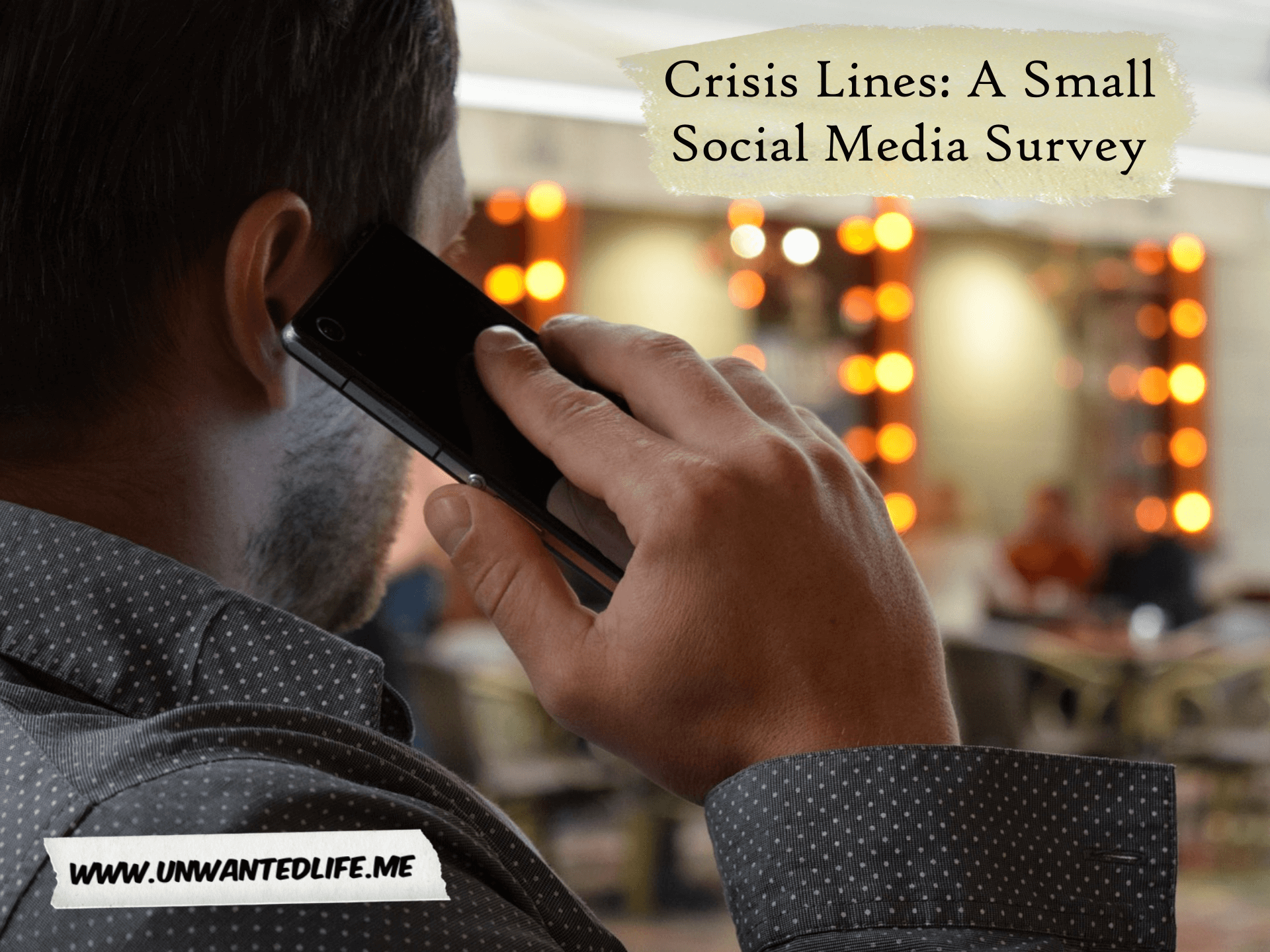

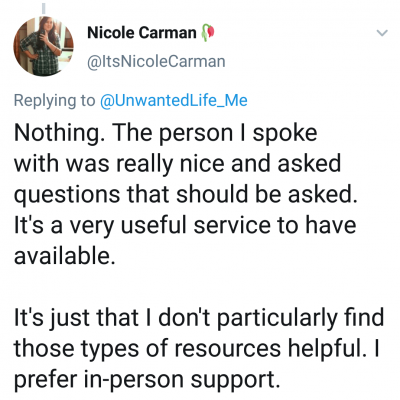
I’ve called Samaritans a number of times and mostly they’ve been very lovely and helpful. The odd occasion I’ve had someone which just didn’t really get it x
I’m sorry to hear that you’ve needed to call such services, but at the same time glad to know that largely they’ve been useful to you.
Hopefully the staff who didn’t quite get it will have improved as they gained more experience or realised such a role wasn’t for them
This survey was a great idea! I have used the line once to know how it works so I could inform others.
That’s actually a pretty good idea if you’re working with at risk people
Such an important thing to raise awareness of – a great idea to do a survey! I’ve used crisis lines multiple times and had good & bad experiences. I think it usually depends who’s on the other side of the phone.
Who the staff member is on the other end does seem to be quite significant, but a part of that also has to be down to how good the training is, I think
I’ve never used a service like that so it was really interesting for me to read the experiences that other people have had, good and bad. Listening is definitely important in a role like that, I can understand why that was a suggested improvement a few times. It’s great that those services are available when people need them though x
Sophie
They really are a life line to a lot of people
I believe that helplines are a really powerful tool, but it takes the right person on the other end of the phone to make it truly valuable. Huge kudos to the incredible, compassionate people that will sit there asking the necessary questions and helping complete strangers to work through some of their darkest times.
I agree with everything you’ve just said
This was so interesting to read and as someone who has been too scared to call crisis lines in the past it’s been quite reassuring to read that it has been a help to a lot of people. As you said, I think just the simple thing of having someone who’s there just to listen makes such a big difference. Thank you for sharing such an insightful post x
Thank you for sharing your experience of what stopped you from using a crisis line